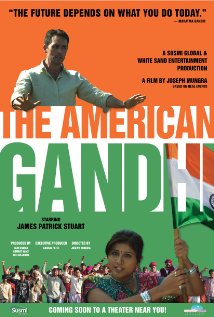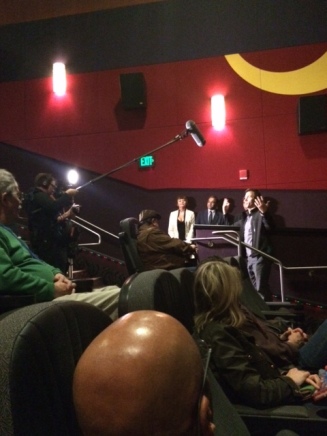
As an aspiring film maker, I decided to do my professional practices piece on a film that was featured at the Eugene International Film Festival. I watched American Gandhi that screened at the Valley River Center Regal Cinema on Friday November 13th. I was very interested by the description of the film about a man who takes a job running a mining operation in India, and gets tangled in the political conflict of the rural village he is displacing to excavate and make profit.
The film cinematography is exquisite, and the imagery of India looks dazzling on screen. The costumes, settings, and music really looked and sounded professional and clean. I thought they did an amazing job capturing great footage and connecting the audience to the setting of rural India. They really made the film look very professional in post production.
One thing that bothered me about the film was the acting. The starring role, played by actor James Patrick Stuart was a bit forced and contrived and I couldn’t help but to feel like his lines, and the lines of some of his co-stars, were not authentic. I think a lot had to do with the writing, but none the less, it was distracting. The film was written by the director/producer Joseph Muraga, who spoke afterwords in a thick Indian accent. I can’t help but to think that his effort to express correct English grammar came across as corny, predictable, and cliché. The dialogue was too perfect and words constructed in ways that we don’t speak naturally.
Aside from the dialogue writing, the story was there. And the message of the film was a good one. When they spoke after the film and took questions from the audience, the main actor spoke about how the film was expressing the idea of profit in business at the price of the soul, and how we exploit humanity in our world. We go after the riches and will sacrifice anything, even the lives of those we love, to accomplish our victory. The star, James Patrick Stuart, also remarked on how the job affected his relationship with his own son, and upon return to the US he made a consorted effort to create a deeper relationship with his family.

I asked about whether they had come across any difficulties with authoritites having produced such a politically charged film, and they said not too much, but they did have to bribe authorities at the airport when bringing in their equipment for filming. They said that the Indian government can be bought at every level and the truth that corruption and illegal activity for the sake of profit happening all the time is common knowledge. Most of the actors and extras in India worked for free just to contribute to the film spiritually. They saw it as sacred work and would not take money for it.
In conclusion, I was inspired by the story and concept, the filming was gorgeous and filled the screen with splendor, but the acting fell a bit flat and glossed the whole project over with an amature tinge. I learned some valuable insight as an aspiring film maker. No matter how much money you have for production value, your actors really make or break the success of the film. But their message and imagery really shined above all. They really captured a timely statement about how the corrupt business phillosophy of American culture preys on and destroys under developed nations for profit, often extinguishing common sense and moral values in its wake.
Please take a moment to see the trailer for this film, and always do your best to support independent films, especially with those of humanitarian interests.
